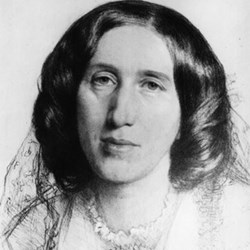Silas Marner
George Eliot's tale of a solitary miser gradually redeemed by the joy of fatherhood. Wrongly accused of theft and exiled from a religious community many years before, the embittered weaver Silas Marner lives alone in Raveloe, living only for work and his precious hoard of money. But when his money is stolen and an orphaned child finds her way into his house, Silas is given the chance to transform his life. His fate, and that of Eppie, the little girl he adopts, is entwined with Godfrey Cass, son of the village Squire, who, like Silas, is trapped by his past. Silas Marner, George Eliot's favourite of her novels, combines humour, rich symbolism and pointed social criticism to create an unsentimental but affectionate portrait of rural life. (Goodreads) Godfrey also arrives at the scene, but resolves to tell no one that she was his wife. Silas decides to keep the child and names her Eppie, after his deceased mother and his sister, Hephzibah. Eppie changes Silas' life completely. Silas has been robbed of his material gold, but has it returned to him symbolically in the form of golden-haired Eppie. Godfrey Cass is now free to marry Nancy, but continues to conceal the existence of his first marriage—and child—from her. However, he aids Marner in caring for Eppie with occasional financial gifts. More practical help and support in bringing up the child is given by Dolly Winthrop, a kindly neighbour of Marner's. Dolly's help and advice help Marner not only to bring up Eppie but also to integrate into village society. Sixteen years pass, and Eppie grows up to be the pride of the town. She has a strong bond with Silas, who through her has found inclusion and purpose in life. Meanwhile, Godfrey and Nancy mourn their own childless state. Eventually, the skeleton of Dunstan Cass—still clutching Silas' gold—is found at the bottom of the stone quarry near Silas' home, and the money is duly returned to Silas. Shocked by this revelation, and coming to the realisation of his own conscience, Godfrey confesses to Nancy that Molly was his first wife and that Eppie is his child. They hope to raise her as a gentleman's daughter, which for Eppie would mean forsaking Silas. Eppie politely refuses, saying, "I can't think o' no happiness without him." Silas is never able to clear up the details of the robbery that caused his exile from Lantern Yard, as his old neighbourhood has been "swept away" and replaced by a large factory. No one seems to know what happened to Lantern Yard's inhabitants. However, Silas contentedly resigns himself to the fact that he now leads a happier existence among his family and friends. In the end, Eppie marries a local boy, Aaron, son of Marner's helpful neighbour Dolly. Aaron and Eppie move into Silas' new hous
-
Autore:
-
Anno edizione:2015
-
Editore:
-
Formato:
-
Lingua:Inglese
Formato:
Gli eBook venduti da Feltrinelli.it sono in formato ePub e possono essere protetti da Adobe DRM. In caso di download di un file protetto da DRM si otterrà un file in formato .acs, (Adobe Content Server Message), che dovrà essere aperto tramite Adobe Digital Editions e autorizzato tramite un account Adobe, prima di poter essere letto su pc o trasferito su dispositivi compatibili.
Cloud:
Gli eBook venduti da Feltrinelli.it sono sincronizzati automaticamente su tutti i client di lettura Kobo successivamente all’acquisto. Grazie al Cloud Kobo i progressi di lettura, le note, le evidenziazioni vengono salvati e sincronizzati automaticamente su tutti i dispositivi e le APP di lettura Kobo utilizzati per la lettura.
Clicca qui per sapere come scaricare gli ebook utilizzando un pc con sistema operativo Windows




